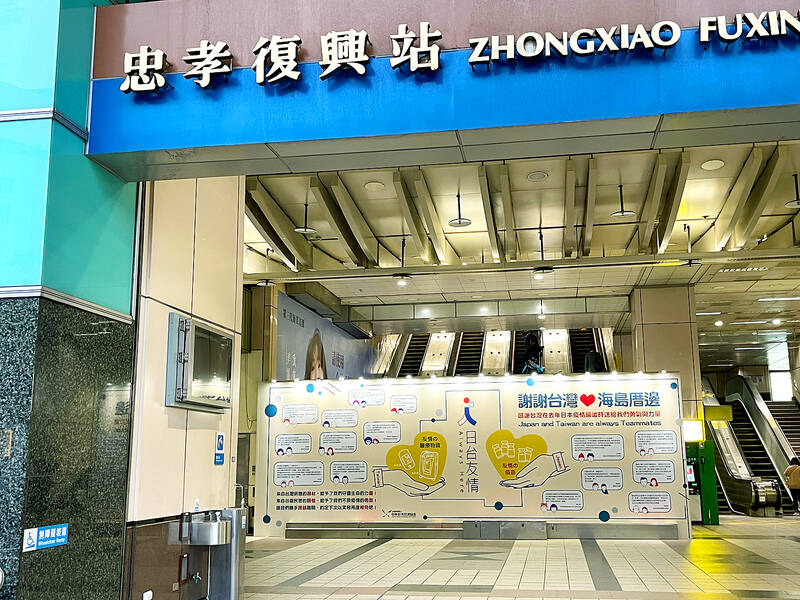The prices of housing units near four Taipei MRT stations surged more than 20 percent last year, data complied by Evertrust Rehouse Co (永慶房屋) showed.
Prices of housing units near Zhongxiao Fuxing Station, at the intersection of the Wenhu and Bannan MRT lines, increased the most compared with those near the system’s other 118 stations.
Prices of houses near the station rose 23.8 percent on average from a year earlier to NT$1.073 million (US$35,175) per ping (3.3m2), real-estate transaction data from the Real Price Registration System showed.

Photo: CNA
In second place were housing units near Beimen Station on the Songshan Line, where the average housing price rose 23.8 percent to NT$726,000 per ping last year.
The price increases are mainly due to the introduction of several property development projects near Beimen Station, which are expected to boost economic development in the area, Evertrust research manager Chen Chin-ping (陳金萍) said.
Posting the fourth and fifth-largest increases were housing units near Xinbeitou and Fuxinggang stations in Beitou District (北投), where prices rose 21.2 percent and 21 percent to NT$519,000 and NT$467,000 per ping respectively, the data showed.
The sharp increase in prices near the two stations was mainly due to a low base of comparison from the previous year, Chen said.
House prices near Wanfang Hospital Station on the Wenhu Line surged 18.9 percent to NT$591,000 per ping thanks to the number of public utilities and facilities in the area, such as hospitals and sports centers, she said.
Being close to an MRT station is a highly desired attribute for many home buyers in Taipei and New Taipei City because properties near MRT stations tend to sell for more, she added.

The Eurovision Song Contest has seen a surge in punter interest at the bookmakers, becoming a major betting event, experts said ahead of last night’s giant glamfest in Basel. “Eurovision has quietly become one of the biggest betting events of the year,” said Tomi Huttunen, senior manager of the Online Computer Finland (OCS) betting and casino platform. Betting sites have long been used to gauge which way voters might be leaning ahead of the world’s biggest televised live music event. However, bookmakers highlight a huge increase in engagement in recent years — and this year in particular. “We’ve already passed 2023’s total activity and

Nvidia Corp CEO Jensen Huang (黃仁勳) today announced that his company has selected "Beitou Shilin" in Taipei for its new Taiwan office, called Nvidia Constellation, putting an end to months of speculation. Industry sources have said that the tech giant has been eyeing the Beitou Shilin Science Park as the site of its new overseas headquarters, and speculated that the new headquarters would be built on two plots of land designated as "T17" and "T18," which span 3.89 hectares in the park. "I think it's time for us to reveal one of the largest products we've ever built," Huang said near the

China yesterday announced anti-dumping duties as high as 74.9 percent on imports of polyoxymethylene (POM) copolymers, a type of engineering plastic, from Taiwan, the US, the EU and Japan. The Chinese Ministry of Commerce’s findings conclude a probe launched in May last year, shortly after the US sharply increased tariffs on Chinese electric vehicles, computer chips and other imports. POM copolymers can partially replace metals such as copper and zinc, and have various applications, including in auto parts, electronics and medical equipment, the Chinese ministry has said. In January, it said initial investigations had determined that dumping was taking place, and implemented preliminary

Intel Corp yesterday reinforced its determination to strengthen its partnerships with Taiwan’s ecosystem partners including original-electronic-manufacturing (OEM) companies such as Hon Hai Precision Industry Co (鴻海精密) and chipmaker United Microelectronics Corp (UMC, 聯電). “Tonight marks a new beginning. We renew our new partnership with Taiwan ecosystem,” Intel new chief executive officer Tan Lip-bu (陳立武) said at a dinner with representatives from the company’s local partners, celebrating the 40th anniversary of the US chip giant’s presence in Taiwan. Tan took the reins at Intel six weeks ago aiming to reform the chipmaker and revive its past glory. This is the first time Tan